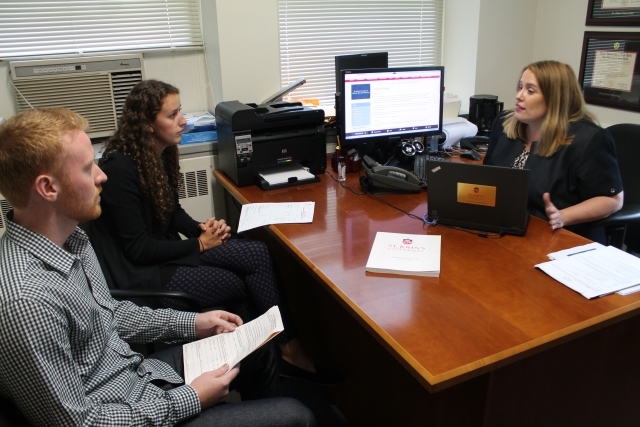
As a response to emerging trends in graduate education that favor “micro-credentials,” St. John’s College of Liberal Arts and Sciences now offers three graduate digital badges in Autism, Behavioral Research Methods, and Environmental Analysis. The badges - which students can display on LinkedIn, Twitter, Facebook, and an online resume or curriculum vita (CV) - demonstrate skill and expertise in a designated area and give earners a professional edge amid a competitive global market.
Creating the badges for St. John’s College was the idea of Laura Schramm, Ph.D., Professor of Biological Sciences and Associate Dean for the College’s Graduate Division. “We are very excited to announce the launch of our Digital Badges in St. John’s College of Liberal Arts and Sciences,” said Dr. Schramm. “The badges demonstrate student competencies in a variety of skills, ensuring their online resumes stand out to future employers. We see digital badges as ways to respond to the professional development of our students and prospective employers to facilitate the perfect match and success of our students.”
“Digital badges are an excellent way to document specific skills and knowledge a student has developed during their course of study,” said William Chaplin, Ph.D., Professor and Chair of Psychology. “Although this information is available in a student’s transcript, the badges conveniently group related courses so that their skills are more readily displayed. For example, students in psychology generally develop research skills that can be immediately applied in the workplace, and the Behavioral Research Methods badge highlights this skill set. Our students may also concentrate in content areas and our Autism badge highlights such a concentration.”
The badges may be earned independently or on the way to a full graduate degree. Courses applied to badges at St. John’s may be applied to master’s and graduate certificate programs within the College, with approval of the program director and Dean’s office.
“Digital badges will give those who obtain them a way to stand out from the competition in their chosen profession. They can also be an entrée into new professions,” said Jeffrey W. Fagen, Ph.D., Dean of the College and Professor of Psychology.
Graduate students who wish to complete one of the badges must complete the required three-credit courses for each badge:

Autism
- PSY 744 Assessment Methods for Students with Autism Spectrum Disorders
- PSY 745 Applied Behavior Analysis
- PSY 746 Single Case Design in Autism Spectrum Disorder

Behavioral Research Methods
- PSY 603 Statistical Design in Research
- PSY 604 Psychology Laboratory
- PSY 659 Psychological Measurement and Scaling

Environmental Analysis
- BIO 299 Scientific Literacy and Integrity
- CHE 202 Separation Techniques in Chemistry
- CHE 200 Environmental Chemistry
For more information about digital badges and how to obtain one, visit our Digital Badges web page.
